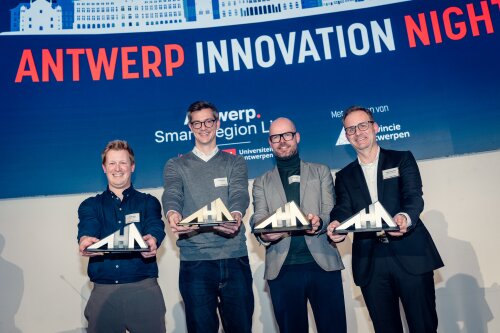
On December 4th, 2025 the AHA!-awards 2025 were handed out during the fourth edition of the Antwerp Innovation Night, organised by Antwerp Smart Region Link, the networking platform of the University of Antwerp and Voka -Chamber of Commerce Antwerp-Waasland. At this ceremony, also two innovative companies were given a place in the spotlight with the 'One to Watch' and 'Innovation' AHA!-award.
Winners of the AHA!-awards 2025
Maarten Weyn won the AHA!-award in the categorie 'Achieved' for his expertise in ultra-low-power wireless communication, localisation, and sustainable Internet of Things (IoT). His research has been commercialised into spin-off companies such as Aloxy, CrowdScan and IoSA.
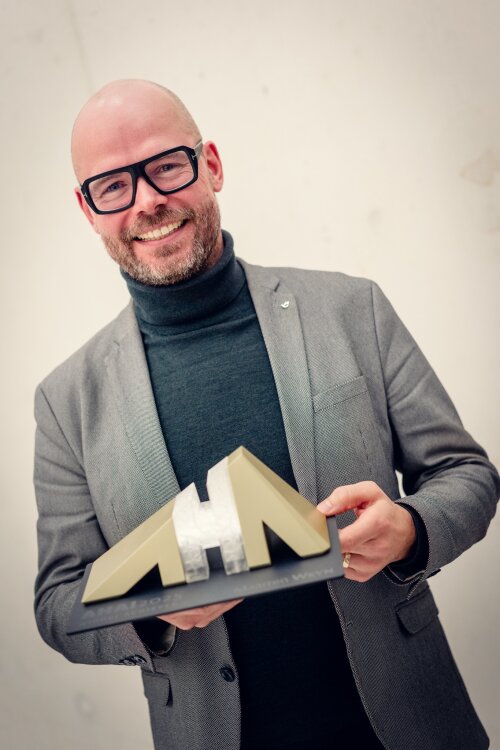
Stefan De Wachter is the winner of the AHA!-award in the 'Promising' category for his pioneering research in the field of neuromodulation to treat urinary incontinence and the establishment of Amber Therapeutics.
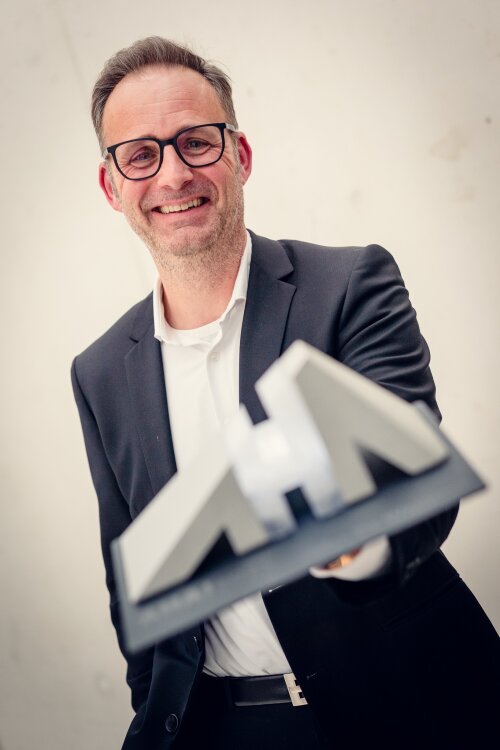
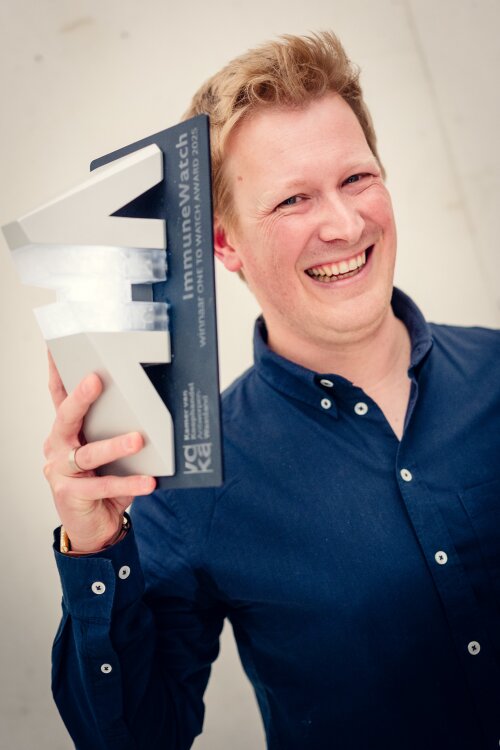
The 'Innovation'-award for the most innovative company was awarded to iFLUX for their future-proof groundwater monitoring solutions.
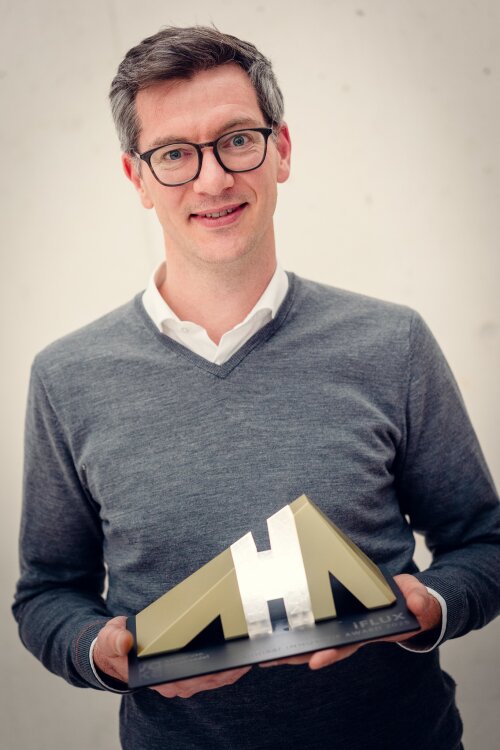
Nominees in category 'Achieved'
The four nominees in the category 'Achieved', recognising established innovation accomplishments, were:
Herwig De Smet – KdG Applied Informatics
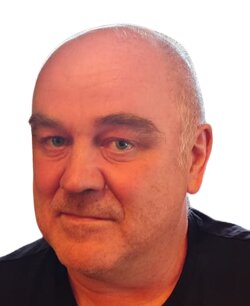
Herwig De Smet is a pioneer in Applied Informatics research at KdG. Since 2015, he also built a bridge with the Expertise Centre for Sustainable Chemistry (now Research Centre Sustainable Industries). A key result of this cross-pollination is SUSSOL, an AI-based software tool replacing traditional solvents in industrial applications with eco-friendly alternatives. This marks a significant step toward enhancing sustainability in the chemical and pharmaceutical industries.
Johann Marquez-Barja – UAntwerp Faculty of Applied Engineering
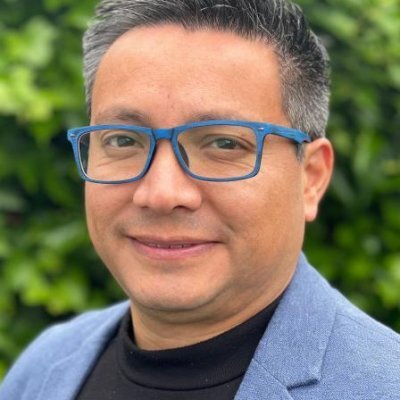
Johann Marquez-Barja leads the Programmable & Intelligent Networks team within the IDLab research group. His work has been pivotal in the creation of advanced 5G/6G testbed infrastructures, enabling cutting-edge developments in Connected and Automated Mobility and fostering collaborations with leading companies across Europe. He has been recognised with over 30 awards for leadership, innovation, and research excellence. His international reputation is further reflected in his appointment as Distinguished Lecturer for the IEEE Vehicular Technology and Education Societies, his Fellowship of the European Association for Innovation, and his inclusion in the Top 2% of researchers worldwide in Telecommunications & AI, as ranked by Stanford/Elsevier in 2024.
Maarten Weyn – UAntwerp Faculty of Applied Engineering
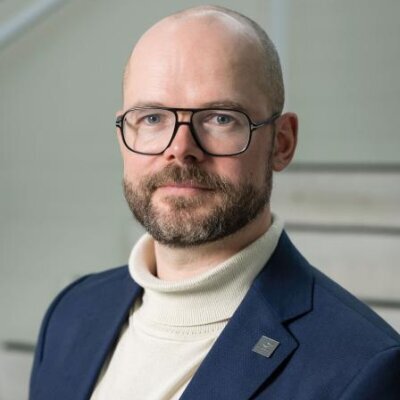
Maarten Weyn is full professor and Vice-Rector Research & Impact at the University of Antwerp, where he is also the Scientific Director of the imec-IDLab-UAntwerp research group. He is a leading expert in ultra-low-power wireless communication, localisation, and sustainable Internet of Things (IoT). His research has resulted in more than 200 peer-reviewed publications,multiple patents, and has been commercialised into spin-off companies such as Aloxy, CrowdScan and IoSa. His team plays a leading role in European 6G projects (eg. Hexa-X-II), collaborating with industry leaders such as Nokia, Ericsson, and Siemens. Besides research, he teaches wireless communication systems and has developed internationally adopted IoT courses. His dedication to teaching has been recognised by students with the “Gobelijntje” award. Maarten also actively engages with the broader public. He was one of the creators of the television program ‘Team Scheire’ on CANVAS and co-hosted the Nerdland Makertalk podcast, showcasing how research can reach and inspire a broader audience.
Paul De Meulenaere – UAntwerp Faculty of Applied Engineering
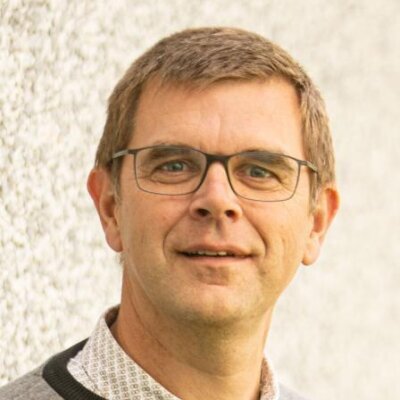
Paul De Meulenaere's research leadership is at the centre of this technological revolution, as over the past decade, digital transformation and cyber-physical systems have been crucial for maintaining the competitiveness of our Flemish industry. By combining his expertise in model-based development of embedded real-time systems with extensive industrial experience, he serves as a vital bridge between academic research and transformative industrial applications in mechatronics and automotive engineering. His research at CoSys-Lab focuses on critical challenges such as functional safety, reliability and automatic design space exploration, all essential for the future of autonomous systems and Industry 4.0 and 5.0 applications. The establishment of spin-off DT Valley in 2021 illustrates his ability to translate research into practical solutions.
Nominees in category 'Promising'
The eleven nominees in the category for 'Promising' innovation trajectories were:
Christophe Deben – UAntwerp Faculty of Medicine and Health Sciences
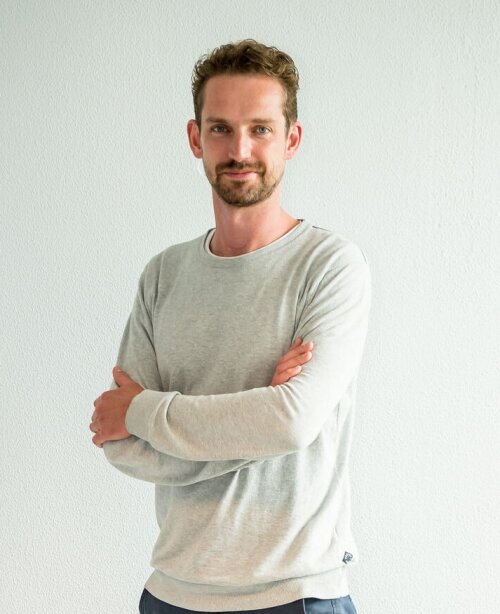
Christophe Deben and his team advance cancer research with a clear patient-centered mission, turning research into impact through collaboration. He established the UZA/UAntwerp Tumor Organoid Biobank and launched DrugVision.AI, a €750K state-of-the-art automated screening platform combining robotics, AI, and live-cell imaging to accelerate functional precision medicine. His pioneering work has led to four patent applications and two spin-offs, Orbits Oncology and Sightera Biosciences, bridging academic discovery and clinical application. Christophe’s strength is to engage the entire value chain: clinicians, academic and commercial organoid researchers, software engineers, lab suppliers, technology partners, and CROs. This collaborative ecosystem drives biomarker discovery, clinical response prediction and next-generation therapeutics, bringing personalised cancer treatment within reach for patients.
Design Sciences Hub – UAntwerp Faculty of Design Sciences
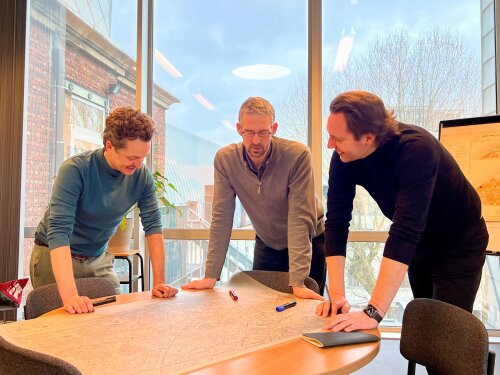
The Design Sciences Hub (DSH) is a research and innovation team tackling systemic challenges at the crossroads of urban development, architecture, spatial planning, and mobility. Thomas Vanoutrive is an expert in mobility, accessibility, and transport poverty. He bridges transport policy analysis with citizen science initiatives like Straatvinken. Maarten Van Acker is an authority in infrastructure and urban design. As vice president of Europan Belgium and member of multiple quality chambers, he advises on planning commissions, infrastructure projects, and international design competitions. Tom Coppens specialises in spatial governance and complex project management. He is a strong public voice in debates on the land-use shift and financing green-blue infrastructure. Their mission is to answer questions such as: how can we make cities healthier and more livable; how can mobility be better organised at the neighborhood, city, and regional scale; how do we create and finance sustainable living environments where affordable housing, vibrant public spaces, and resilient green-blue networks coexist; and how do we prepare for the big transitions ahead, including circular economy, energy shifts, and smart mobility?
Els Du Bois – UAntwerp Faculty of Design Sciences
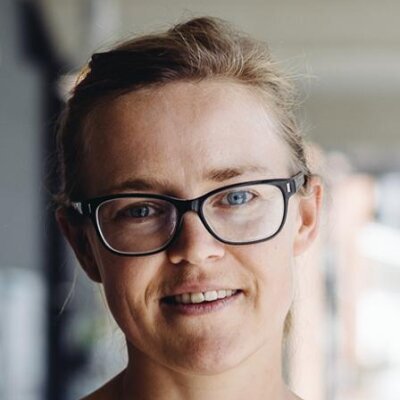
Els Du Bois is a research professor specialised in ecodesign and circular product innovation. Her work focuses on reusable products, extending product lifetimes, user acceptance, and circular design strategies. Her key towards sustainability is in the balance with feasibility, desirability, and viability. She founded the REuseLab, an impact lab within the University of Antwerp, driving industry collaboration in healthcare, fashion & textiles, packaging, and consumer goods. She leads interdisciplinary projects such as REmedi on reusable sets for clinical trials (with BD & Cerba Research), REuse In Style on lifetime extension of fashion items (with JBC, Torfs & Decathlon), and projects tailored to industrial partners like f.e. Samsonite. Through these efforts, the lab translates academic expertise to the industry and drives the transition towards a sustainable future where reuse is the norm.
Geert Van de Weyer and Deborah Hilderson – KdG Research Centre for Future-driven Education
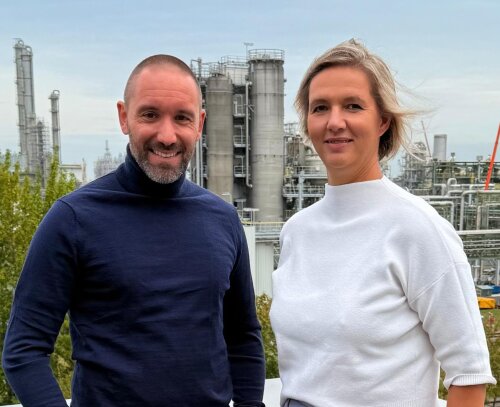
Geert Van de Weyer and Deborah Hilderson made notable contributions through research on the reliability and validity of assessing practical skills. What began in nursing,specifically in evaluating station-based exams,has grown into SkillsUpp, an innovative assessment app and methodology. They are now piloting and refining this tool in the petrochemical sector and port industry. Strong interest from industry partners highlights its potential, with a promising spin-off expected. The societal and economic impact value of their work is already tangible: companies testing the app report greater objectivity in evaluations, improved workplace safety through fewer accidents, and reduced costs thanks to fewer errors.
Jo Verbeeck – UAntwerp Faculty of Science
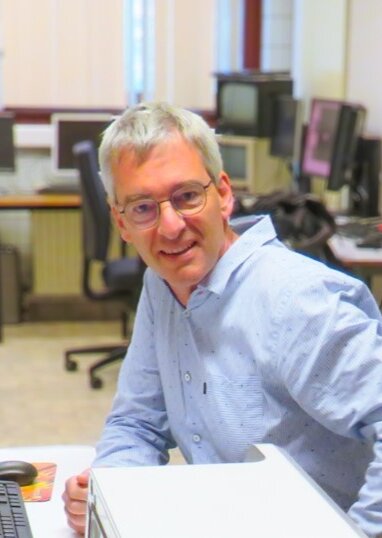
Jo Verbeeck is a pioneer in the use and development of transmission electron microscopy techniques for (nano) materials science. He has a deep interest in the boundary where creative novel technology approaches fundamental physics limits and finding ways to outsmart them, combined with a strategic, valorisation-driven mindset and a critical approach to evaluating new ideas, always with a clear focus on real-world applications and societal impact. This is evident in the successful launch of the spin-off AdaptEM, and the exciting prospect of two additional spin-offs expected to launch in Fall 2025. His passion is especially ignited by innovations that advance sustainability, health, and ecology.
Joris Beckers – UAntwerp Faculty of Business and Economics
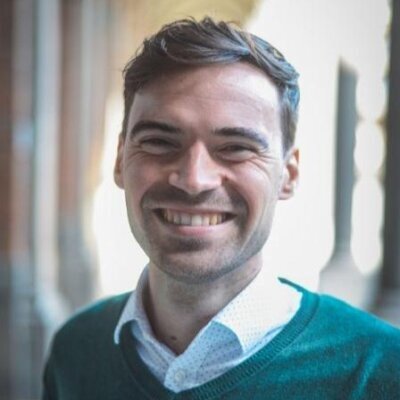
Joris Beckers has built strong connections with industry during his nearly three-year tenure track professortship career. This led to the valorisation of an urban logistics model that has been adopted by both companies and government administrations. The model was also used as background knowledge in an impressive amount of European Horizon 2020 and Interreg projects, and the setup of an annual urban logistics summer school with large industry input and participation. His policy advisory work includes membership of the Flemish Mobility Council, which brings together industry and academia to give policy advice, and has at times also involved providing input to policymakers, for example to Flemish Minister De Sutter during the update of the Postwet.
Karolien Poels – UAntwerp Faculty of Social Sciences
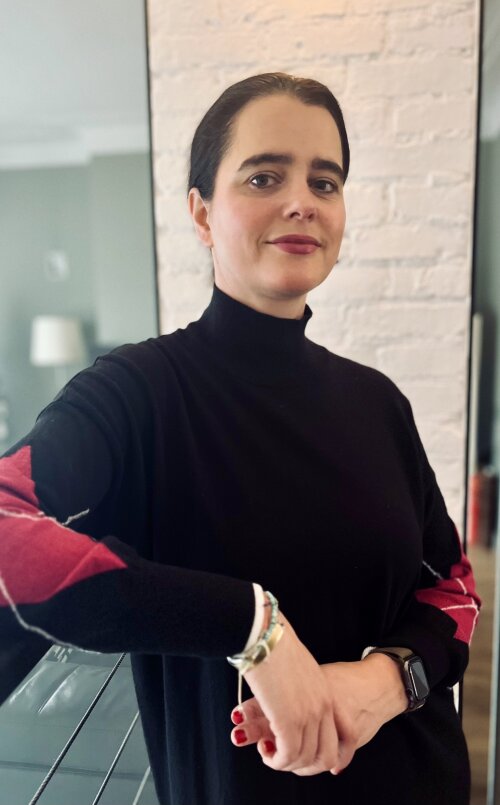
Karolien Poels studies strategic communication for complex societal challenges, focusing on emotion-driven processes. As one of the founders and directors of the Antwerp Social Lab, a UAntwerp core facility, she develops and deploys psychophysiological and behavioral methods to capture human interactions in interpersonal and technology-mediated settings. She is involved in national and international projects on how people deal with media and technology, and how these insights can be leveraged for media and technology products and services. These insights are relevant for industry collaborations across media, health, and tech. Her work supports evidence-based messaging, product and service design, and responsible innovation.
Lowie Spriet and Jeroen Cluckers – AP Immersive Lab
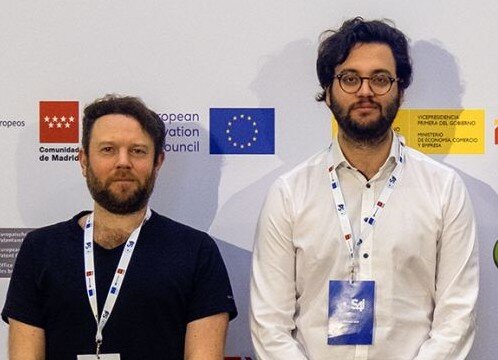
Jeroen Cluckers and Lowie Spriet have gone through an incredible journey. They started their valorisation journey in AP’s Immersive Lab as passionate researchers with an innovative idea to develop a real-time Promptable AI Camera (PAIC). After only one year of hard work they filed a patent application and they are about to launch a spin-off company. PAIC offers creative freedom to millions video content creators. They will be able to enhance their content in real-time with simple text prompts. The technology eliminates the technical barriers that content creators encounter nowadays, even for those with limited budgets or little technical knowledge. PAIC boosts sustainability both front- and backend: it is 3 to 4 times faster per Graphics Processing Unit and it reduces user trial-and-error. In a short time, the researchers have built a strong network of industrial partners across various sectors, including visual design, video production, media, branding, advertising, automotive and live events, all of which have shown strong interest.
Siegfried Vlaeminck – UAntwerp Faculty of Science
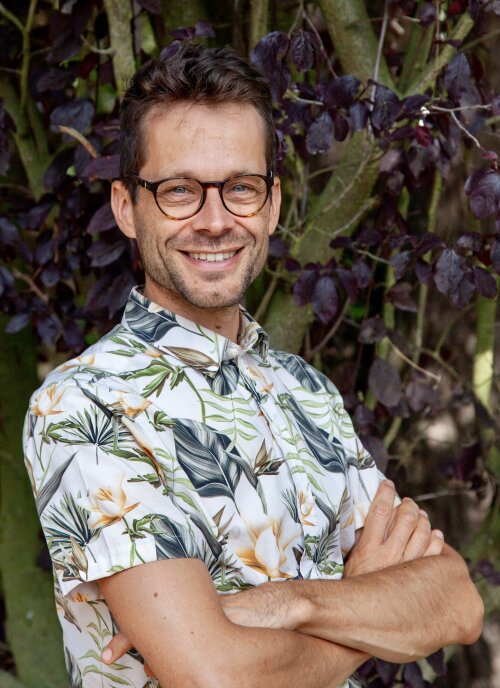
Siegfried Vlaeminck is a dynamic innovator in microbial cleantech. He and his team develop microbial processes and conduct systemic assessments to advance sustainable wastewater treatment, nitrogen conversion, and food production. Their work spans from microbial discovery to the translation of innovations into sustainable industrial and environmental solutions.
His expertise also supports Flemish and Belgian policymakers on issues related to nitrogen, water quality, and food safety. For national and international companies and agencies, the team provides consultancy on complex wastewater challenges and on circular life-support systems for spaceflights. Siegfried is the inventor on two filed patents. He promoted the Water-Link Academic Chair, resulting in a tool now implemented by the drinking water company. The team has built a strong European portfolio of collaborative R&D projects with industry and leading research institutes and has contributed to scaling up several microbial technologies.
Driven by his vision, several valorisation trajectories are advancing towards industrial uptake or spin-off creation. TwinMemBio introduces a dual-membrane concept for space- and energy-efficient water reuse, now entering pilot scale. PurpleHealth develops nutraceutical aquafeeds based on purple bacteria, with first successes demonstrated and additional promising trials ongoing. BioCatcher enables safe and resource-efficient nitrogen recovery, having completed its first pilot. BioChromatiX is being prepared as an industrial service platform for producing, processing, formulating, and characterizing microbial pigments and antioxidants.
Stefan De Wachter – UAntwerp Faculty of Medicine and Health Sciences
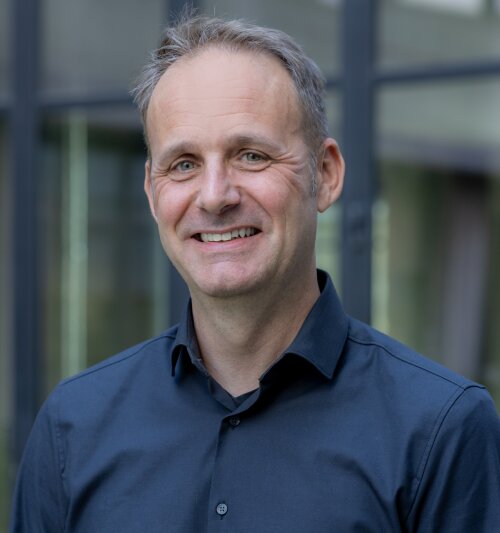
Stefan De Wachter is a pioneer and globally recognised researcher in the field of neuromodulation to treat urinary incontinence. He has several research collaborations with major players in the field and is inventor on more than ten patent applications. He has developed two surgical techniques, one of which forming the basis of the establishment of Amber Therapeutics, a spin-off of UAntwerpen, UZA, Queen Mary University of London and University of Oxford. As co-founder and Chief Scientist, he plays a crucial role in the further development of the company. In 2024, Amber Therapeutics successfully closed a $100M Series A financing round, one of the largest Series A investments ever secured by a medical technology company in Europe. The funding is currently utilised to progress the development and regulatory approval of the company’s first product, an adaptive neuromodulator for women with mixed urine incontinence, a medical condition affecting millions of women worldwide.
Wout Bittremieux – UAntwerp Faculty of Science
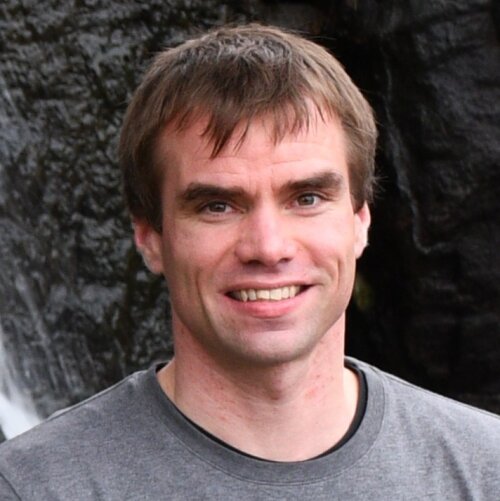
Wout Bittremieux has built a valorisation record in AI for molecular discovery. He has already secured multiple IOF POC grants and a VLAIO Innovation Mandate as PI, demonstrating both creativity and the ability to translate ideas into practice. In parallel, he established industry collaborations with Johnson & Johnson and Thermo Fisher Scientific, highlighting the relevance of his work to global leaders. The anticipated trajectory for his valorisation efforts is the creation of a spin-off within the next two years, underscoring his commitment to turning academic breakthroughs into economic and societal impact.